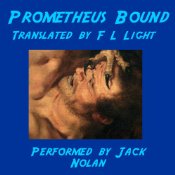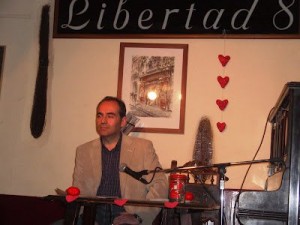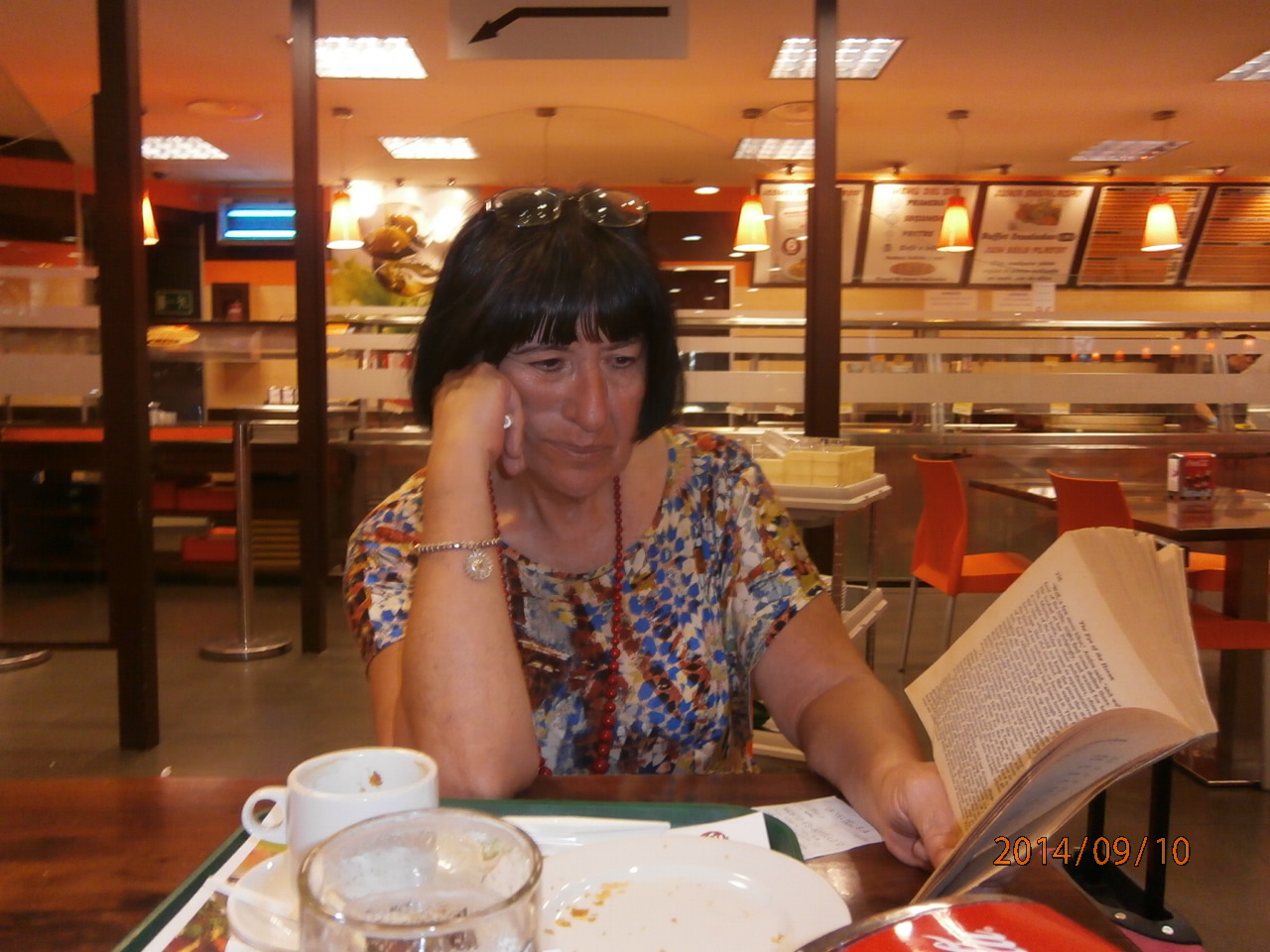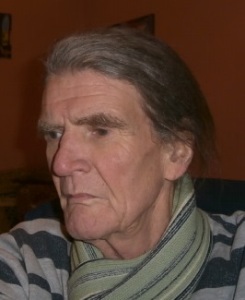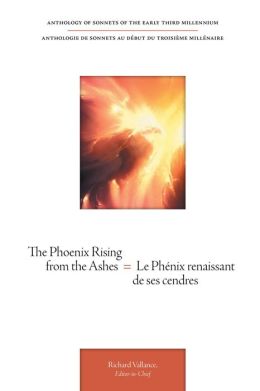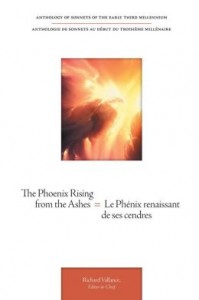Prometheus Bound Aeschylus Translation by F L Light Rapid Traffic Press New York. The opinions expressed in this manuscript are solely the opinions of the author and do not represent the opinions or thoughts of the publisher. The author has represented and warranted full ownership and/or legal right to publish all the materials in this book. Prometheus Bound: Translated by F L Light ISBN-13: 978-1477684016 ISBN-10: 1477684018 All Rights Reserved. Copyright © 2012 Frederick Lazarus Light, lightforth@gmail.com
*
After Zeus has learned that Prometheus stole his sovereign property, fire, and conveyed it to mankind, he orders Hephaistos, under the direction of Power and Force, to bind his adversary to an arduous crag of most difficult remoteness on the earth. As the Titan responds to this punishment, the reader is inspired with the fire of individual affirmation, devoted indomitably to life and liberty
Prometheus Bound Audio Jack Nolan 15 minutes
Power and Force
Hephaistos
Prometheus
Daughters of Ocean
Ocean
Io
Hermes
*
1
Enter Power and Force, leading Prometheus in chains.
Hephaistos comes with them.
Of earth, in Scythia intraversable,
By men untraced, of no man’s realm a tract,
On this sequestered precipice recessed
Alone, we’ve mounted, where, Hephaistos, be
This duty yours, by dictates laid upon
You by the Father: here his shackled lich set fast!
This vaulting overreacher in revolt
With fettered punishment now fasten here
In this immense removedness on high,
Leaving him with adamantine tautness
Reclusely manacled to rock. Your flower,
In every art effectual, lucent fire,
He reaved and to the mortals gave. This fact
Therefore by forfeit to the gods he must
Avow, in shackles schooled to suffer Zeus
And learn in painful awe what lordship is,
Philanthropy disowning in effect.
You’ve done your part, no longer stayed. But I
Lack mettle, truly loath that ligatures
Upon a kindred deity must be laid
With muscled rigor in this brumal rift
Where winter reigns. But for all that I must
Begin, emboldened by necessity,
By absolute exigencies; for who
May lightly heed the word of Zeus without
Reward? You, of ascendant prospects, son
Of right-proposing Themis, now I pierce,
Against your will and mine, with bronze constraints
Of indissoluble abuse, annealed the best,
Your members to this far recess, reserved
From men, where voice nor form shall human be.
But under Helios, desiccated scathe
2
Beneath his arid glance you’ll bear and lose
The bloom of youth. When Night behind her vestment of
The stars shall veil this blaze, you’ll savor peace,
And when the sun on dawn-frost comes, the thaw
May grateful prove. But everforth abide
In vitiated weariness, effete at length,
For not yet born your liberator is.
Such mede you profit in, philanthropy
Maintaining. Not of Heaven terrified,
Olympian odium never daunted you,
A god among the gods. But honors out
Of measure to the mortal sort you sped.
So this sore ledge you’ll suffer like a ward,
Where insultation is insomnolent
Forever, as you stand in sleepless rue,
Not left to bend your legs. With sacred cries,
Your liefest prayers, lamenting pain, will not
Be heeded. For the head of Zeus in zeal
Is hateful, hardest to his foes. And those
Empowered lately fulsome power inflict.
In vain? A god in basest odium deemed
No friend, whom gods detest, wherefore not hate?
Since mortals gracing, mordant grief to you
He meant, your prize betraying, all for men.
Devout companionship not lightly deaded.
No doubt when Zeus imposes on your will.
This vanity where nothing you’ll achieve.
Are not imputed to your sacred forge!
3
All grace, and none has liberty save Zeus.
Who will observe you lagging in abuse.
With hammered concentration maul them in,
Compressive rivets bringing home in rocks.
Your stress! Leave nothing loose by limb. He is
Prodigious, legerly deliverance
Seeking, howbeit fixed in boulders fast.
Though for mechanic prudence most renowned,
What little prescience lights his brain compared to Zeus.
But he due reprehension might impress.
His breast, amain to breach it with a blow.
Again you dote on the Olympian’s foe.
Erelong, you might, bethink you, mourn yourself.
Proportioned. Now his loins with girdles lap.
Is overhard, on duty to enlarge.
Should bite. Now bending down, encompassment
About his legs begin, with links intent.
Perfected, without much mechanic pain.
4
Our critic in this work is rigorous.
Tendentious constancy to me nor grudge
What moody dourness may be mine in Power.
Exit Hephaistos.
To men, as evanescent as ephemeral,
The prizes meant for gods conveying. Will
Your muscled dolors fall away by mortal hands?
You were, Prometheus, by the gods misnamed,
For now a true promethean you require
To set you from this fabrication free.
(Fxeunt Power and Force.)
O aerial mercy all for life on earth,
O swiftest taking wing, you sudden winds,
O mobile rivers melted from the hills;
O roundge of Ocean risible in scope to rise
Like cacchination on a shore; 0 Earth
Omnimaternal, and thou god in ken
Of all, by sight to compass land and sea,
Lord Helios; thus I cry you, crucified
By gods, observe the torture I abide.
Behold, embodied with indignities
To bear this teen, millenia timed, a doom
Allotted, eldritch hourly whilst I howl.
Such is the bondage, abject sacredly,
That this new master of Olympians has
For me discovered. Pheu, pheu, everforth
To pine as now in pain, and thus I moan,
No term foretelling of the dire at length
Ordained, in full extended to the fine.
5
What’s this I say? All that shall be, I’ve known
Betimes correctly, never to abye
A sudden daunt. So with the lightest grace
Of patience left to me, this fated dole
I must support, aware a sacred force,
Necessity, will not be checked. I can
Neither bear silence nor unsilenced truth
Sustain about my lot. This falls by me
Because I granted fiery guerdons to
Mankind; this yoked affliction, over me
Enforced, ensues therefore. By Zeus unseen,
My trace was furtive to the source of fire.
A fennel stalk I filled therewith. For men
Didactic light then blazed, all daily arts
Evoking, and a mighty furtherance
To them it proved. For such a peccant fact
I’ve earned this pain, here overborne, constrained
Under the pervious skies with perceant nails.
Eala, ea, ea!
What sound by wing, what scent would come about
Me, not perceived by form? Is it divine
Or human or a cross of both? Upon this rock,
Peripheral afar, what advent might
Ascend in search of pain to see me peak?
Or what in meaning might proceed? Alas,
In gyves behold me girt, a god benign,
My fate abusive, to the Father Zeus
A foe, by all in loathing held that haunt
The sovereign’s hall, for having charity
Too much on men conferred, with love confirmed!
Pheu, pheu, the whirring hither, once again
I hear it, likely of a flock. Upon
Their flicker, lightly vibrant, now the air
Reverbs. But fear ensues, whatever comes.
Chorus:
6
No dread avow. Our advent, drawn
By love, this ledge surmounted. Leagued
In flight, a winged agon we maintain.
Our father’s leave uneathe we have.
With all traversing speed, at length
In Zephyr’s hand, ascent continued.
In depths recessed beneath our dome of caves
The clang of ferric clatter could
Be heard. Our deepest pudor, verecund
In Ocean, was effaced, affrighted thence
Thereby. And thus unshod, ascending
On this car, we shot to you.
Aiai, aiai,
Of breeder Tethus, of prolific geneses
In broods of goddesses, you all are born,
Of Father Ocean, whose insomnolent
Domain of currents the circumference
Of earth completes, conducive to all tides.
Observe me, by these fetters see
How on the uppermost abyss of earth
I am held fast, the bleakest watch enduring.
I see, Prometheus; and upon mine eyes,
In spread suffusion like a mist, now tears come
forth,
Since under this embodied adamant
You’re bound to waste on these chasmatic rocks,
In caitiff insultation cadent seen.
For on Olympos the new helmsmen lead,
Where Zeus, with novel laws, would reign
Perforce awry; and what held good
Before in prime has been dissolved like death.
If he precipitated into depths
Below terrestrial bournes myself in bonds
7
As low as Hades, loathly hosteler
Of liches in the earth, where Tartarus
Unpierced incarceration keeps, then no
God in malignant gloating or none else
Would at these wretched throes look down on me.
But now a hapless bauble for the winds I am
And grieve as much as Zeus rejoices at my grief.
Which god is pleased to see it? Who would not
Condole your subject dolor, who but Zeus?
A god too wreakful to surcease revenge.
By toughest constance the Titanic kind
He’d quell. Surcease before satiety
This god allows not till another’s hand
May his unseizable domain command.
The time ensues, assure you soon or late,
Though here in twist the bonds are tied,
For torture binding with each turn,
When He, that marshal of the blessed,
Shall suffer need, myself in prayer
Seeking about the latest plot,
How it would shift him from the throne
And sceptre. Then his sweetest spell
Of sugared cant will savor ill,
Not win me over. Shall I then
Before his menace quail or at
Monitions tell? These violent gyves
Must be dissolved, and guerdons, just
In godly recompense, he must
Be willing to convey before
He learn the secrets of my lore.
F L Light in three categories of poetry has produced most of his work:
In epic his original works are Fighter Herakles Perforce, Shakespeare Undiminished, The Woman of Venereal Furies, A Book of Girds for Bob Giroux, and Cleopatra’s Kingdom of Idolatry. These are all in sonnets written. His translated epics are The Iliad in 1823 sonnets, and the Argonautica, about seven hundred sonnets.
In drama, he has written twenty eight dramas, all in his own form of Greek tragedy. Twenty four of them comprise the Gouldium, a series about Jay Gould and his enemies.
Light has also translated six Greek tragedies, four of which have been produced for Audible.
Light has published about thirty five books of couplets, most of them on economics. Shakespeare Versus Keynes is now in production for Audible.
Buckle &, Lucid Rhythms, Raintree Review, International Poetry Review, Cowboy Poetry Press, Mobius, Hrafno, and Troglodyte are some of the magazines he has appeared in.
